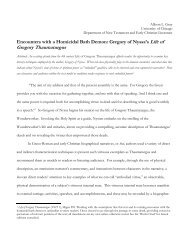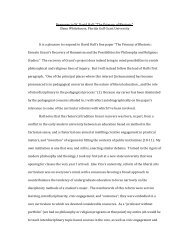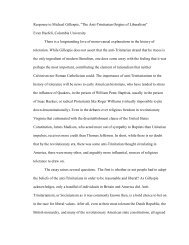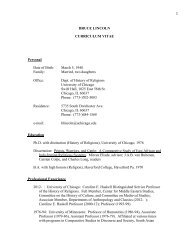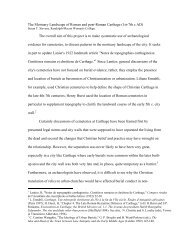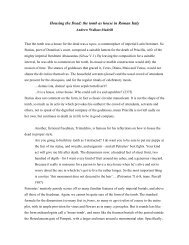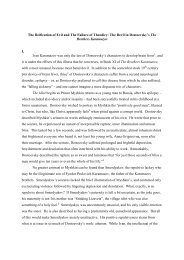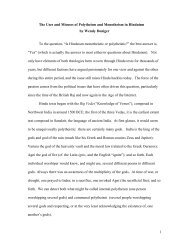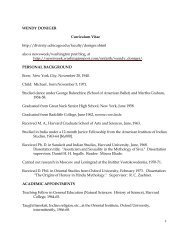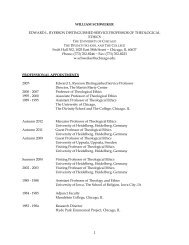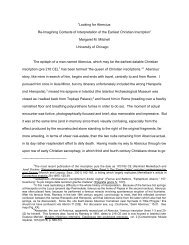*Criterion Winter 02-4.16 - Divinity School - University of Chicago
*Criterion Winter 02-4.16 - Divinity School - University of Chicago
*Criterion Winter 02-4.16 - Divinity School - University of Chicago
Create successful ePaper yourself
Turn your PDF publications into a flip-book with our unique Google optimized e-Paper software.
Mark tells <strong>of</strong> a Jesus on the move, who undertakes the journey to the epiphanic locale to have<br />
that most paradoxical (and religiously problem-posing) experience—a private epiphany.<br />
two Sundays in January, right after Christmas (this year, January<br />
6 and 13), causing a kind <strong>of</strong> “liturgical whiplash” as we<br />
rebound from Christmas toward an almost imminent Lent.<br />
Epiphany in western churches since the mid-fourth century<br />
(the time Rome began to impose the December 25 date for<br />
Christmas on the east) commemorates the Christian midrashic<br />
account found in Matthew 2 <strong>of</strong> the magi from the east<br />
arriving in Bethlehem <strong>of</strong> Judea. These mavgoi (technically<br />
trained specialists in the epiphanic arts) have come because<br />
they have seen (ei[domen) “his star in the east” (2:2). But<br />
coming to meet a baby king whose birth is publicized by a<br />
heavenly light show, they instead meet his antitype, a<br />
king who acts lavqra/, “in secret,” and tries to defeat the<br />
purposes <strong>of</strong> “the star that is made to appear”—oJ fainovmeno~<br />
ajsthvr (2:7). But, as the passive voice here alludes, King<br />
Herod is not in charge <strong>of</strong> this epiphany, and it proceeds<br />
without his consultation or consent in the night sky above<br />
his kingdom, where the magi continue to track it with their<br />
eyes. Interestingly, in the text it is upon “seeing the star”<br />
(ijdovnte~ to;n ajstevra [2:10]) standing still above the<br />
child’s humble habitat—and not the child himself!—that<br />
they “rejoiced with a very great rejoicing” (ejcavrhsan<br />
cara;n megavlhn sfovdra [2:10]). Only thereafter do they<br />
enter the house and “see the child” (ei\don to; paidivon<br />
[2:11]). Then they react as one should to an epiphany (biblical<br />
and otherwise): they fall to the ground and assume a<br />
prostrate position <strong>of</strong> reverence and obeisance to the god<br />
revealed (not coincidentally also a posture from which<br />
vision <strong>of</strong> the divine apparition is rendered well nigh impossible)—pesovnte~<br />
prosekuvnhsan aujtw Ê`(2:11). They<br />
also <strong>of</strong>fer the gifts Isaiah promised right-minded Gentiles<br />
would one day bring to Jerusalem when they wake up and<br />
smell the philosophical monotheist c<strong>of</strong>fee (“the Lord will<br />
arise upon you, and his glory will appear over you. Nations<br />
shall come to your light, and kings to the brightness <strong>of</strong> your<br />
dawn . . . They shall bring gold and frankincense, and shall<br />
proclaim the praise <strong>of</strong> the Lord!” [Is 60:2–3, 6 NRSV]). The<br />
reader <strong>of</strong> Matthew’s gospel is led to conclude that the divine<br />
will to self-disclosure has once again triumphed over the<br />
nefarious forces <strong>of</strong> “secrecy” personified by Herod.<br />
24 WINTER 20<strong>02</strong><br />
Traditions earlier than Matthew’s infancy prelude associated<br />
the moment <strong>of</strong> Jesus’ ejpifavneia on the earthly scene not<br />
with his birth, but with his baptism at the wet hands <strong>of</strong> John,<br />
as in Mark’s wonderfully stark incipit (Mk 1:9–11). In three<br />
terse verses Mark tells <strong>of</strong> a Jesus on the move, who undertakes<br />
the journey to the epiphanic locale to have that most<br />
paradoxical (and religiously problem-posing) experience—<br />
a private epiphany. Whereas in Matthew’s and Luke’s revised<br />
versions <strong>of</strong> Mark’s narrative the baptism is depicted more as<br />
a moment <strong>of</strong> public proclamation <strong>of</strong> Jesus’ identity to John’s<br />
cohort <strong>of</strong> fans, in Mark’s it is a “secret epiphany”—Jesus<br />
alone sees the heavens split open (the curtain must be<br />
opened for one to peer into God’s dwelling), and the spirit<br />
descend. It is to him alone that the deity, visible both through<br />
the split veil and the ornithomorphic realm-traversing spirit,<br />
declares “you are my son, the beloved; in you I have been<br />
well pleased” (1:11). This narrative neatly unites one divine<br />
ejpifavneia with another—God appears to affirm that the<br />
Jesus who has just shown up in public is divine, a son <strong>of</strong> a<br />
divine being (hence one epiphany is attested to by another).<br />
The completion <strong>of</strong> an epiphany narrative should be the act<br />
<strong>of</strong> proskuvnhsi~—prostrating homage and worship—but<br />
the Gospel according to Mark has a different plot structure<br />
in mind, whereby that act will be delayed for fourteen chapters.<br />
Mark’s literary peek-a-boo plot was aptly captured by<br />
Martin Dibelius’s description <strong>of</strong> the work as the “book <strong>of</strong><br />
secret epiphanies”—a deliberate oxymoron meant to describe<br />
an architectonically oxymoronic text. Mark transfers the<br />
epiphany from a crowd scene (which he himself has set up<br />
in 1:5, where he describes the literally incredible cast <strong>of</strong> folks<br />
who flocked to John at the Jordan) to Jesus alone (as we have<br />
noted), because he wishes his text, and not the historical<br />
event <strong>of</strong> baptism by John, to be epiphanic, a revelation<br />
directed not to the damp crowd on the banks <strong>of</strong> the Jordan,<br />
but to Mark’s readers, who will watch in privileged amusement<br />
when in the scenes that follow human beings will continue<br />
to engage in a different form <strong>of</strong> manifestation—<strong>of</strong> their own<br />
ignorance in the face <strong>of</strong> the son <strong>of</strong> God. None will understand<br />
the message <strong>of</strong> the baptismal epiphany shared in<br />
winked collusion by the reader and Mark, and all—even




